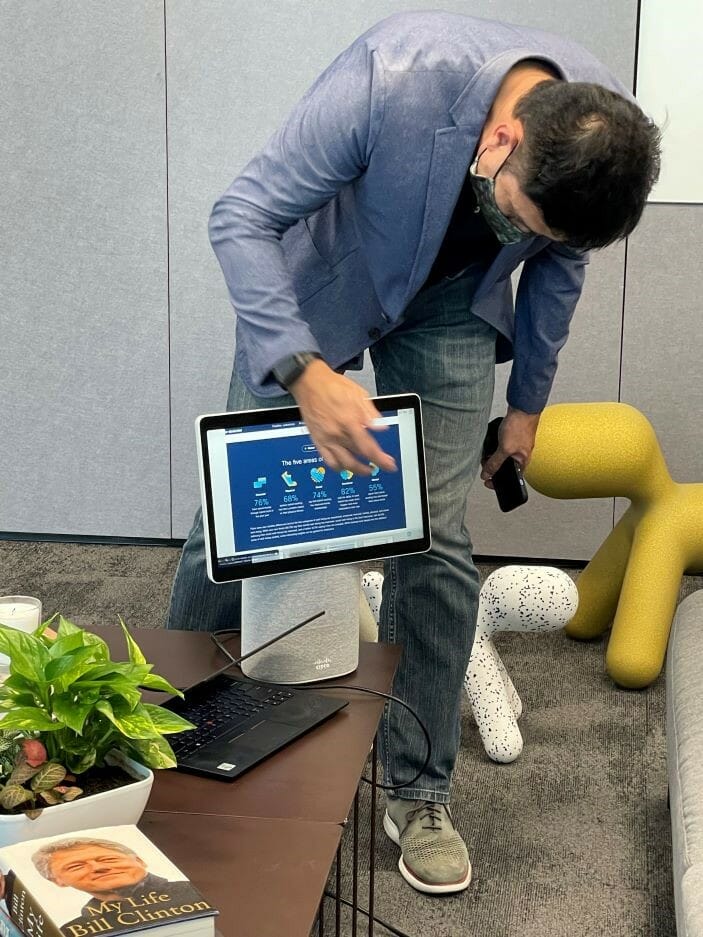During the pandemic, many organisations asked their employees to work from home without offering any guide on how they should cope or manage their home activities and work. For most of us, the minute we enter our homes work is forgotten and the focus will be on the family.
Like in any situation mankind is forced to face, employees adapted and became quite efficient in handling the task given by their superiors while still looking after their families. With recovery well underway, some corporations have adopted a hybrid working environment giving their employees time to adapt and regain some sort of semblance in this new world people are waking up to.
But does this new format of working really work for both employees and employers?
According to a survey conducted by Cisco which asked 28,000 respondents globally about hybrid working readiness, apart from improving total employee wellbeing, hybrid working also brings work-life balance to an employee while organisations have benefited from higher employee productivity levels.
Bee Kheng Tay, Cisco ASEAN President shared further insights from the survey; 64% of employees surveyed claimed hybrid work has improved productivity, while 65% believe their quality of work has been better which bodes well for organisations. As for employees, by working in this manner 73% said they manage to save roughly 4 hours a week from reduced time from commuting and unplanned office interactions. The time saved was reinvested by spending with family, friends, and pets.
Respondents in Malaysia also found similar benefits when asked if they are ready for hybrid work, the study found that three in five (60%) employees in Malaysia believe that quality of work has improved. A similar number (55%) felt that their productivity has enhanced. Three-quarters of employees (75%) also feel their role can now be performed just as successfully remotely as in the office. However, the survey of 28,000 employees from 27 countries, including over 1,011 respondents from Malaysia, reveals that only one in five (20%) Malaysian employees think that their company is ‘very prepared’ for a hybrid work future. This is lower than the global average of 23%.
“The last two years have shown us that work is no longer where we go, but what we do. In a hybrid normal, employees and employers in Malaysia are experiencing tangible benefits from improved employee wellbeing to better productivity and work performance,” said Hana Raja, Managing Director, Cisco Malaysia. “However, hybrid work is more than just supporting a safe office re-entry. Leaders need to rethink how to cultivate an inclusive culture, place employees – their experience, engagement, and wellbeing – at the centre, and modernize their networking and security infrastructure to provide a seamless, secure, and inclusive employee experience,” she added.
Cisco’s research examined the impact of hybrid working on five categories of well-being – emotional, financial, mental, physical, and social wellbeing – with over three-quarters of respondents (79%) saying hybrid and remote working has improved various aspects of their wellbeing.
Time away from the office has improved work-life balance for 79% of employees in Malaysia –compared to the regional average of 81%. More flexible work schedules (71%) and significantly reduced or completely removed commuting times (49%) contributed to this improvement. Around two-thirds of people (68%) saved at least four hours per week when they worked from home, and over a quarter (29%) of respondents saved eight or more hours a week.
Four in five (82%) Malaysian respondents also say that their financial well-being improved, with their average savings reaching to over RM 32,891 (USD 7,488) a year. A sizeable 86% ranked savings on fuel and/or commuting among their top three areas for savings, followed by decreased spending on food and entertainment at 80%. Over eight in 10 (83%) believe they can maintain these savings over the long term, and 60% would take these savings into account when considering changing jobs.
In addition, seven in 10 (72%) respondents believe their physical fitness has improved with remote working. A similar number (69%) say hybrid working has positively impacted their eating habits.
A significant majority (80%) indicate that remote working has improved family relationships and 44% of the respondents reported strengthened relationships with friends.
Future Of Work Is Hybrid, But First…
The future of work is hybrid, according to 74% of employees in Malaysia who say they want a combination of a remote and in-office hybrid working model in the future, compared to a fully remote (22%) and fully in-office (5%) experience.
However, there is uncertainty over how different work styles might impact inclusion and engagement. Over half (59%) of Malaysian respondents believe micromanaging behaviors had increased with hybrid and remote working. A lack of trust from managers that their employees can be productive has been a common thorn in their working experience.
“Trust has become a core tenet in our hybrid work normal, alongside flexibility, and empathetic leadership. Our latest research indicates that more needs to be done to fully integrate hybrid work arrangements for employees, especially when it comes to building an inclusive culture powered by efficient technology infrastructure in this new world of working that employees clearly prefer. Leaders and companies need to commit to actions that go a long way to retain their people – listening, building trust, and leading with empathy, flexibility, and fairness” said Anupam Trehan, Senior Director, People & Communities, Cisco, APJC.
At the same time, technology will remain critical to enabling a future with increasingly diverse and distributed workforces. Nearly two-thirds of (64%) respondents believe having connectivity issues regularly is career-limiting for remote workers. As a result, 82% say networking infrastructure is essential for a seamless working-from-home experience, but around 36% say their company still needs the right networking infrastructure.
Over three-quarters, (76%) of respondents in Malaysia believe that cybersecurity is critical for making hybrid working safe, but only 61% say their organization currently has the right capabilities and protocols in place. Only 62% think that all employees across their company understand the cyber risks involved with hybrid work, and 67% think business leaders are familiar with the risks.
“Technology is a key enabler of growth in the hybrid workplace, and it needs to be underpinned by end-to-end integrated security. Organizations should prioritize a robust security posture that underpins every digitalization effort and ensure that cybersecurity is at the core of their technology architecture said Juan Huat Koo, Director of, Cybersecurity, Cisco, ASEAN.










